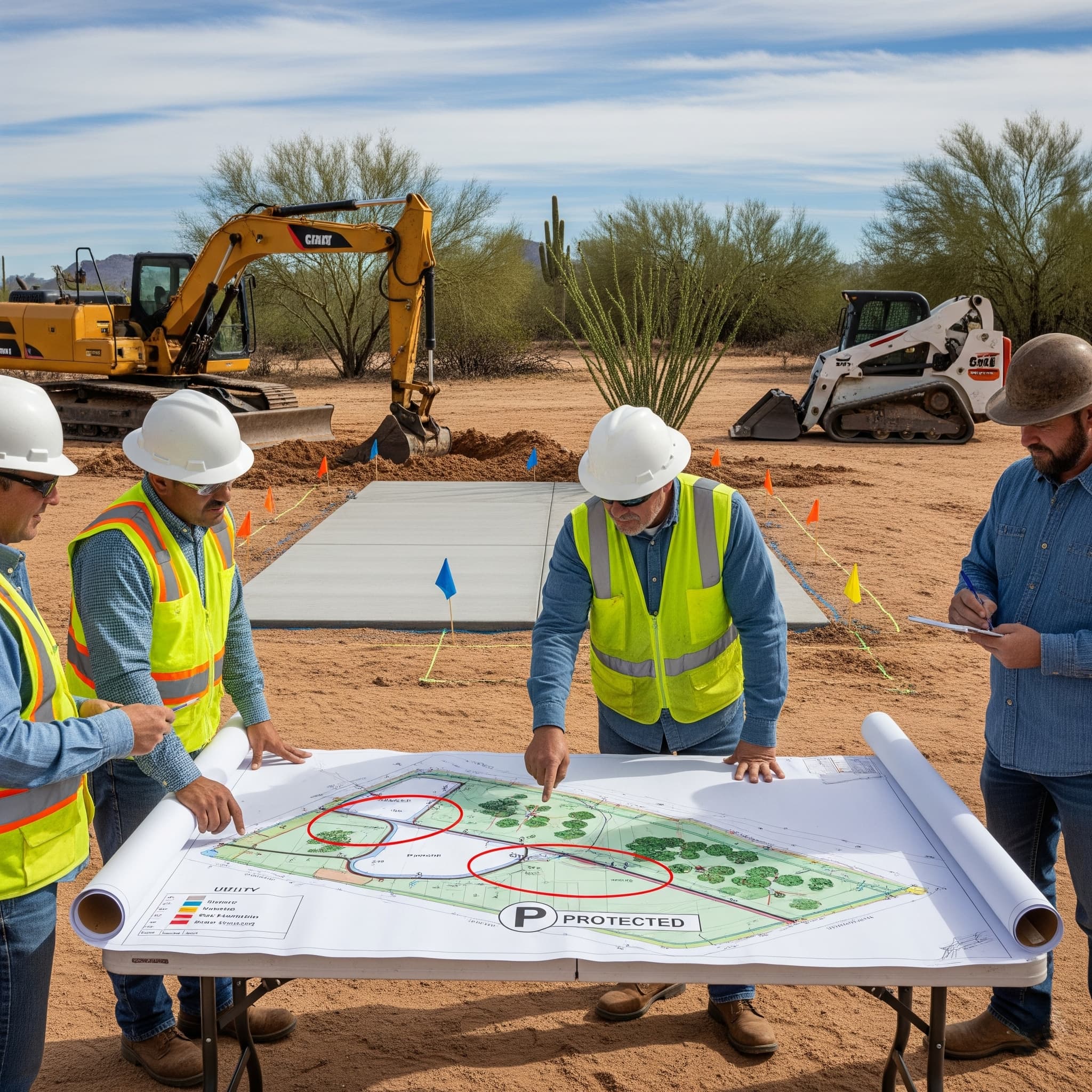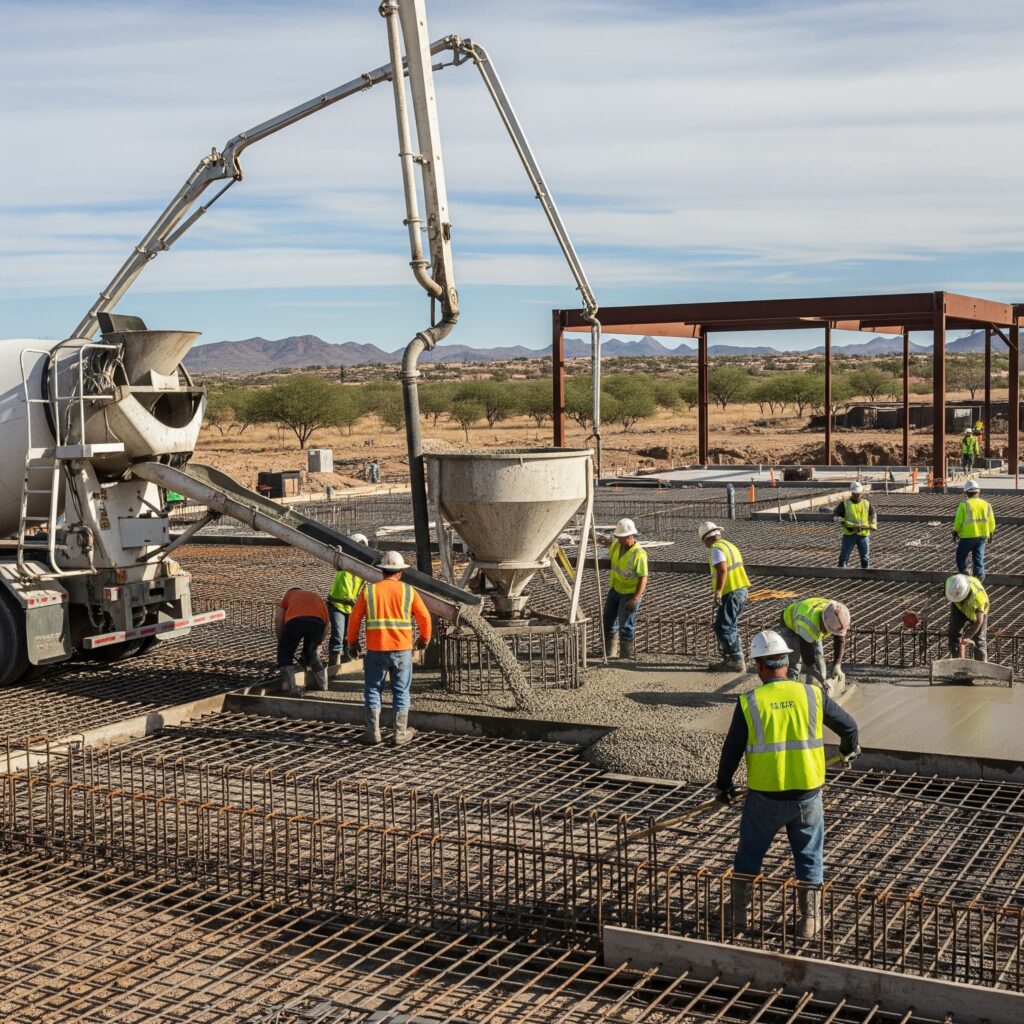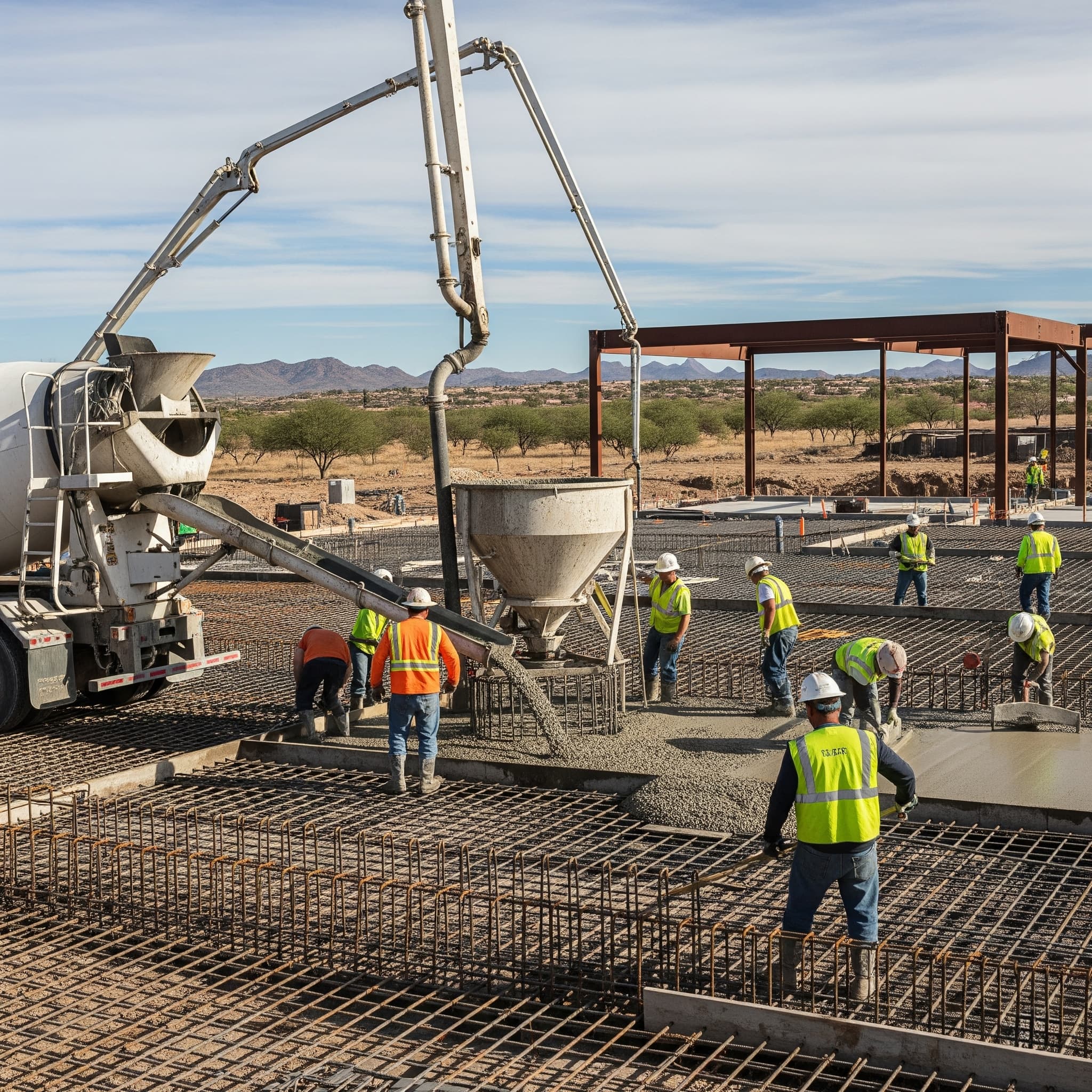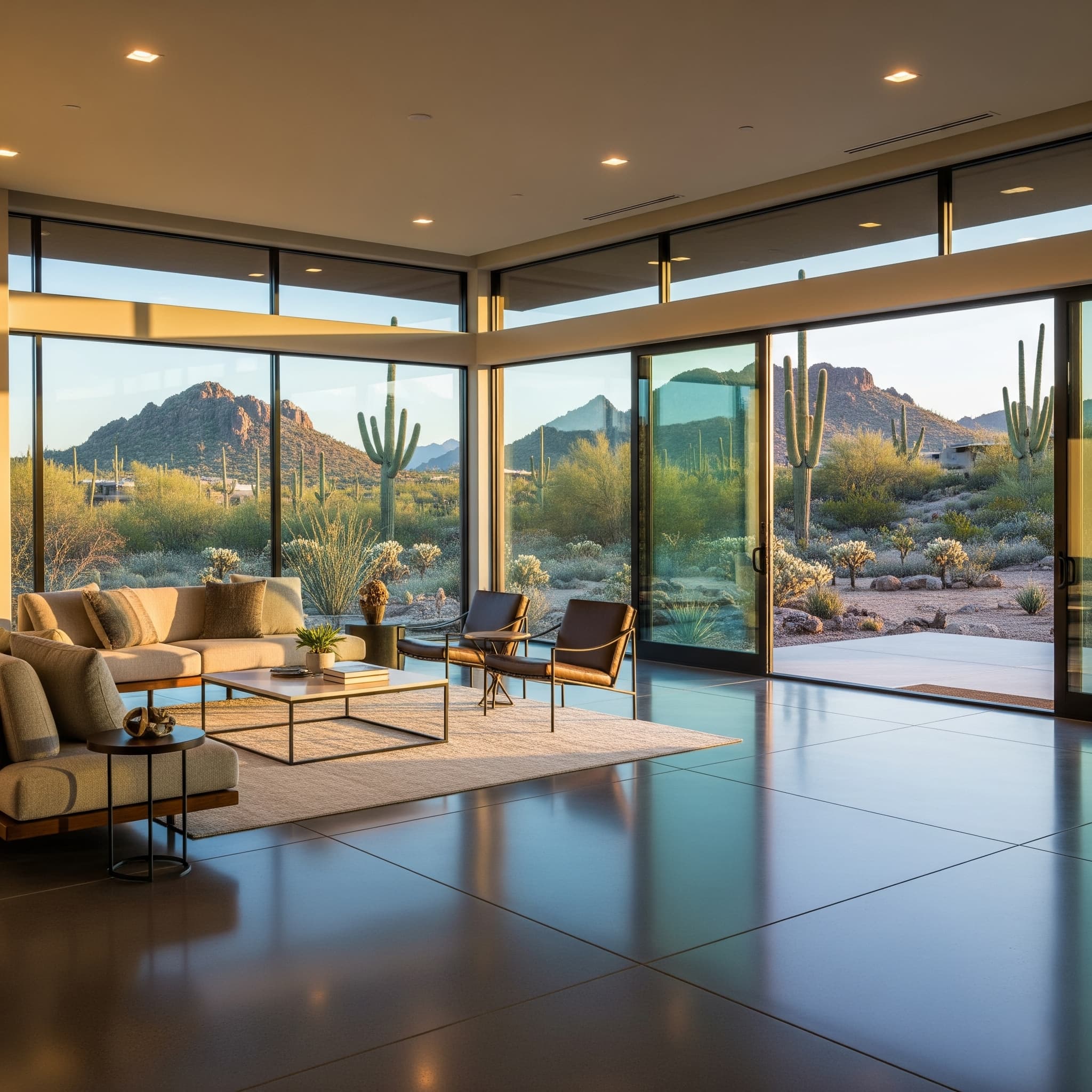
Sierra Vista Commercial Concrete: What Businesses Should Know
Commercial Concrete Sierra Vista
Sierra Vista’s growing business base has created an increased need for reliable, high-performance, commercial concrete solutions that can handle the demands of a harsh Arizona desert environment and be delivered with the efficiency and reliability required by commercial development. Commercial concrete construction is needed at retail developments adjacent to Fort Huachuca and industrial developments across Cochise County. The commercial concrete construction process requires a unique combination of knowledge in the design of commercial structures, the selection of the most suitable commercial concrete materials, and the application of commercially accepted installation techniques. Business owners are able to make informed decisions regarding their commercial concrete investment when they have a thorough understanding of the commercial requirements. The extreme temperature fluctuations, intense ultraviolet radiation, and monsoon season of Arizona create a unique set of environmental concerns that do not exist in residential concrete projects. In addition to addressing the needs of each project as efficiently and economically as possible, professional commercial concrete contractors also must address the complexities of local building codes, accessibility requirements, and performance specifications to deliver each project on time and on budget.

Commercial Concrete Applications and Specifications
Commercial concrete is used in a wide variety of ways to fit the needs of specific performance demands in the field. A warehouse floor must be able to withstand the heavy load of machinery and forklift traffic. In retail stores, the focus is on appearance and safety for customers. An office building will have smooth and even floors for the use of partitions and technical equipment. A manufacturing facility will need chemical-resistant floors with special drainage systems for the production process.
High-strength concrete mixes are commonly used for commercial developments in Sierra Vista to provide for the extreme conditions found in Arizona while also meeting or exceeding required performance standards. High-strength mixes are formulated to exceed 4,000 PSI compressive strength. They are designed to be durable, resistant to shrinkage, and easy to place in high-temperature conditions.
Load-bearing Capacity
Commercial concrete projects are subjected to much greater loads than those found in residential applications. Retail stores must have floors that can support large displays of merchandise. Industrial facilities will have floors that can support equipment weighing more than 1,000 pounds/square foot. An engineer’s professional analysis will ensure that sufficient reinforcement is placed correctly in the structure and that it has sufficient thickness to meet the load-bearing requirements of the application.
Compliance with Building Codes and Permits
Commercial construction in Arizona is governed by the International Building Code (IBC) and local amendments to the IBC for each jurisdiction. Sierra Vista has a comprehensive permit application process, which includes stamped engineering plans, structural calculations, and documentation showing compliance with accessibility requirements as defined in the Americans with Disabilities Act (ADA). Commercial concrete projects must meet or exceed strict fire safety requirements, such as having proper egress paths, fire-rated construction, and access to emergency exits.
In addition to providing a single permit for an entire project, there are numerous inspections that take place throughout the construction process. Some examples of the inspections include: foundation excavation, placement of reinforcement, placement of the concrete, and a final inspection to determine if the project meets the requirements outlined in the permit. Cochise County and the City of Sierra Vista have additional requirements for commercial developments, such as compliance with landscaping regulations, stormwater management, and environmental issues that arise when constructing in a desert environment.
Access and ADA Compliance
As part of any commercial concrete project, the contractor is responsible for complying with the Americans with Disabilities Act (ADA) regulations regarding accessibility. The contractor must ensure that all sidewalks, ramps, and parking areas have the correct slope and surface texture so that people with mobility disabilities are able to safely navigate the area. The contractor should consider the ADA requirements at the beginning of the project and make sure they are included in the project plan and executed properly.
Desert Construction and Its Environmental Challenges
Constructing commercial concrete projects in Arizona presents many environmental challenges due to the extreme conditions present in this region. Temperature extremes can result in up to a 60-degree temperature differential from day to night, resulting in thermal stress that could lead to cracks in poorly designed systems. UV-light exposure can degrade the finish on the surface of the concrete and affect how well the color of the finish holds up over time. Low humidity allows for rapid drying of the concrete and makes it more susceptible to surface defects.
To mitigate the environmental challenges associated with desert construction, contractors utilize techniques such as hot-weather concreting practices, specialized curing products, and thermal control methods to complete the project. Examples of thermal control methods include: temperature monitoring, delayed placement scheduling, and enhanced moisture-retaining systems that protect the concrete during critical curing periods.
Monsoons
During the monsoon season in Sierra Vista, intense rainfalls occur that can delay construction schedules and create hazardous working conditions. Due to the potential for water accumulation, commercial projects require advanced drainage planning to protect completed work. Stormwater management systems must be integrated with concrete placement to ensure proper site drainage and prevent erosion around foundations and slabs.
Industrial and Manufacturing Concrete Applications
Industrial and manufacturing facilities require specialized concrete solutions that go beyond typical commercial applications. These projects often involve chemical-resistant surfaces, integrated anchoring systems, and very tight flatness tolerances for machinery mounting. Additives are added to the concrete to provide specific properties for various industrial applications, including oil resistance, electrical conductivity, and increased abrasion resistance.
Fiber-reinforced concrete systems provide increased resistance to cracking and impact damage common to industrial environments. Fiber types include steel fiber, polypropylene fiber, and synthetic macro-fibers, each offering distinct advantages depending on the type of load and application.
Decorative Finishes
Industrial concrete surfaces require specific textures and finishes to meet operational requirements. Slip-resistant finishes provide safety for workers in wet conditions, while smooth-troweled surfaces allow for easy movement and cleaning of equipment. Hardened surfaces protect against wear from heavy traffic and chemicals, extend the lifespan of the surface, and lower maintenance costs.
Office and Retail Space Considerations
For office and retail space development, aesthetics are as important as functionality. Polished concrete floors provide a sophisticated look while providing durability and low maintenance. Decorative finishes available for concrete include: integral colors, stamped patterns, and exposed aggregates that enhance interior and exterior spaces.
Concrete also acts as a thermal mass to moderate interior temperatures in Arizona’s climate and possibly lower energy consumption related to heating and cooling systems. Adequate insulation and vapor barriers should be installed to provide comfortable indoor environments and to prevent moisture damage to the concrete.
Safety for Customers and Liability
Commercial concrete surfaces must provide a safe environment for customers to avoid liability concerns. Properly textured surfaces help prevent slips and falls, and adequate lighting will assist in ensuring safe travel. Proper joint spacing and transitions between different surfaces should be planned to prevent tripping hazards and to provide continuous, smooth pathways throughout commercial spaces.
Planning and Scheduling
Commercial concrete projects require close coordination with other construction trades and must adhere to project timelines. Concrete placement cannot begin until utility rough-in, reinforcement inspection, and form approval have been completed. Weather delays can greatly affect the timeline, and thus, contingency planning is essential to completing a project on schedule.
Sequencing of construction will provide concrete placement under ideal conditions while allowing for continued construction activity. Large commercial projects may consist of multiple concrete placements over several weeks, each week building upon the previous week’s placement.
Testing and Quality Control
Commercial projects require extensive quality-control activities to ensure that the concrete meets project requirements and local building codes. Quality-control activities include: concrete testing, verifying the slump of the concrete, and confirming the compressive strength of the concrete using cylinders tested at a lab. Field quality control verifies that the concrete was properly consolidated, finished, and cured to achieve the desired long-term performance. Third-party inspection agencies provide independent verification that the project meets the specified requirements of the contract documents and applicable building codes.
Budgeting and Cost Considerations
The cost of commercial concrete varies widely based on project complexity, site location, and performance requirements. A basic warehouse floor may cost $4 – $6 per square foot, while a specialized industrial floor may exceed $12 – $15 per square foot, depending on additives and finish requirements. Costs for site preparation, reinforcing, and accessibility will increase the overall cost of a project.
Value engineering is a tool that optimizes concrete specifications to meet the performance requirements of the project while limiting the cost of materials and labor. Professional contractors can identify alternative approaches that maintain quality but reduce costs through efficient design and construction methods.
Return on Investment
A well-placed commercial concrete installation will provide years of service with little to no maintenance. This provides an excellent long-term investment. A quality installation and proper selection of materials will prevent premature degradation and expensive repairs that could interfere with the operation of a business. The energy efficiency provided by the thermal mass of concrete will also reduce operating costs over the life of the building.
Choosing a Contractor and Project Management
Successful commercial concrete projects depend on selecting a contractor experienced in commercial concrete projects, licensed to perform commercial concrete work, and insured to provide for both the client and the contractor. In Arizona, commercial concrete contractors must possess an L-9 Commercial Concrete license issued by the Arizona Registrar of Contractors, ensuring that the contractor has met the necessary qualifications and has obtained the necessary bonding.
An experienced commercial contractor understands the complexities involved in coordinating with other trades, managing inspection schedules, and maintaining quality standards in a difficult environment. The contractor’s knowledge of material selection, mixing designs, and placing techniques will assure project success and minimize delays and excess costs.
Benefits of Partnerships
Creating a partnership with a qualified commercial concrete contractor will provide numerous benefits for future projects and maintenance needs. Experienced contractors can contribute valuable insight during the design phase, enabling the optimization of concrete specifications for performance and cost-effectiveness. The contractor can also provide post-project maintenance recommendations and repair services to extend the useful life of the concrete.
At Sierra Vista Concrete Works, we recognize the unique demands of commercial concrete projects in Arizona’s difficult environment. We believe our extensive knowledge of commercial concrete applications, building code compliance, and desert construction techniques will enable us to provide you with the best possible solutions for the highest-performing commercial concrete for your investment.



